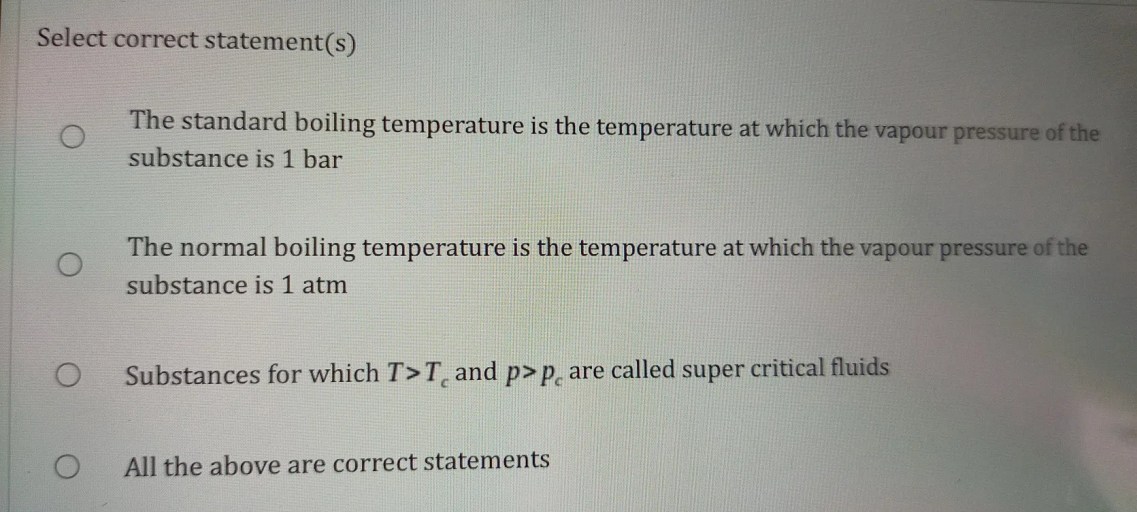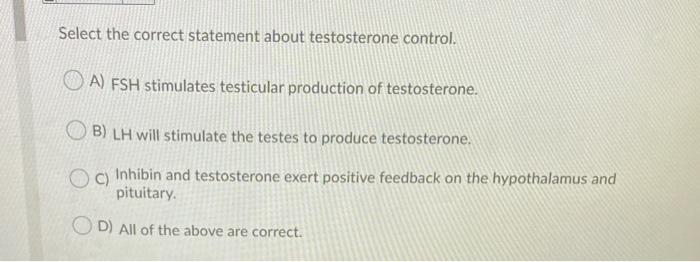Select the correct statement about testosterone control, a crucial aspect of human health, encompasses a wide range of methods and considerations. This article delves into the significance of testosterone regulation, its impact on various conditions, and the ethical implications surrounding its use.
Testosterone control involves regulating the levels of testosterone, a hormone primarily produced in the testes, to maintain optimal health and well-being. The endocrine system plays a pivotal role in controlling testosterone secretion, and factors such as age, genetics, and lifestyle choices significantly influence its production.
Testosterone Control Overview: Select The Correct Statement About Testosterone Control
Testosterone control plays a crucial role in maintaining human health and well-being. It involves regulating the levels of testosterone, a hormone primarily produced in the testes of males and the ovaries of females. Testosterone control ensures optimal physiological functions, including sexual development, muscle mass, and energy levels.
The endocrine system, particularly the hypothalamic-pituitary-gonadal axis (HPG axis), is responsible for regulating testosterone production. The hypothalamus secretes gonadotropin-releasing hormone (GnRH), which stimulates the pituitary gland to release luteinizing hormone (LH) and follicle-stimulating hormone (FSH). LH acts on the testes to promote testosterone production, while FSH stimulates sperm production.
Factors Influencing Testosterone Levels

Various factors influence testosterone production and secretion, including:
- Age:Testosterone levels naturally decline with age, beginning in the late 20s or early 30s.
- Genetics:Genetic variations can affect the production and sensitivity of testosterone receptors.
- Lifestyle choices:Exercise, diet, and sleep can significantly impact testosterone levels.
Regular exercise, a balanced diet, and adequate sleep promote optimal testosterone production. Conversely, excessive alcohol consumption, smoking, and obesity can lower testosterone levels.
Methods of Testosterone Control

Testosterone control can be achieved through various methods:
Hormonal Therapies
- Testosterone Replacement Therapy (TRT):Replaces testosterone in individuals with low levels due to hypogonadism or other medical conditions.
- Anti-Androgen Therapy:Blocks the effects of testosterone in conditions such as prostate cancer or transgender hormone therapy.
Natural Supplements and Herbal Remedies
- Tribulus Terrestris:A herb claimed to increase testosterone levels, but scientific evidence is limited.
- D-Aspartic Acid:An amino acid that may support testosterone production in certain individuals.
Clinical Applications of Testosterone Control

Testosterone control has numerous clinical applications:
Male Infertility
TRT can improve sperm production and fertility in men with low testosterone levels.
Hypogonadism, Select the correct statement about testosterone control
TRT replaces testosterone in individuals with hypogonadism, a condition where the body does not produce enough testosterone.
Transgender Health
Anti-androgen therapy is used in transgender women to suppress testosterone levels and facilitate gender transition.
Sports Medicine and Bodybuilding
TRT may be used illegally by athletes to enhance performance, but its use is controversial and potentially harmful.
Considerations for Testosterone Control
Testosterone control involves potential risks and benefits:
Risks
- Increased risk of cardiovascular disease, prostate cancer, and acne.
- Mood swings, irritability, and aggression.
Benefits
- Improved muscle mass and strength.
- Increased energy levels and libido.
Medical supervision and monitoring are essential when using testosterone control methods. Regular blood tests, prostate exams, and cardiovascular assessments are necessary to ensure safety and effectiveness.
Ethical considerations surrounding testosterone control include performance enhancement in sports and gender identity issues. Balancing the potential benefits and risks is crucial in making informed decisions about testosterone control.
Questions Often Asked
What is the primary role of testosterone in the human body?
Testosterone plays a crucial role in male sexual development and function, including sperm production and muscle mass maintenance.
How does the endocrine system regulate testosterone levels?
The endocrine system, primarily the hypothalamus, pituitary gland, and testes, works in a feedback loop to maintain optimal testosterone levels.
What are the potential risks associated with testosterone control?
Excessive testosterone levels can lead to acne, hair loss, and increased aggression, while low levels can cause fatigue, low libido, and erectile dysfunction.